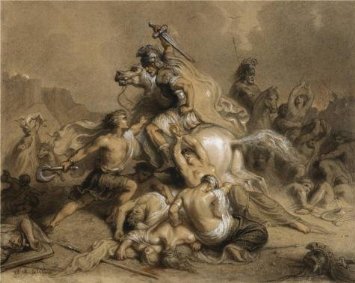Barbarians — a word that today often refers to uncivilized people or evil people and their evil deeds — originated in ancient Greece, and it initially merely referred to people who did not speak Greek, according to Live Science.
Today, the meaning of the word is far removed from its original Greek roots. A poignant example comes from a 2012 speech given by President Barack Obama in New York City.
“When a little boy is kidnapped, turned into a child soldier, forced to kill or be killed — that’s slavery. When a little girl is sold by her impoverished family — girls my daughters’ age — runs away from home, or is lured by the false promises of a better life, and then imprisoned in a brothel and tortured if she resists — that’s slavery. It is barbaric [writer’s emphasis], and it is evil, and it has no place in a civilized world,” he said.
When Obama used the term “barbaric,” he was not referring to non-Greek-speaking people but rather to acts of evil in general. Indeed, the meaning of the word barbarian has changed dramatically over time and, in fact, the word did not always have a negative meaning for everyone.
Greek origins
“The earliest attestation of the word barbarian in Greek literature is in Homer’s descriptions of the Carians as ‘barbarophonoi’…” writes Konstantinos Vlassopoulos, a professor of Greek history at the University of Nottingham, in his book “Greeks and the Barbarians” (Cambridge University Press, 2013).
By “the archaic period [2,700 years ago] there is no doubt that one of the major meanings of the word was linguistic: the Barbarians were those who did not speak Greek.”
He notes that the ancient Greeks themselves used this word in a confusing and contradictory fashion. One problem they had is that there was no agreement among the ancient Greeks as to who spoke Greek and who didn’t, at least up until around the time of Alexander the Great. There “existed a variety of local and regional dialects, which were mutually comprehensible to a larger or smaller degree,” writes Vlassopoulos.
So the original meaning of the word “barbarian” did not refer to acts of evil but rather to those who were not Greek or did not speak Greek. Also who didn’t speak Greek was a matter of debate among the ancient Greeks themselves.
Who is a barbarian?
Among modern-day scholars, and among the general public, the definition of barbarian gets even more confusing.
“If there is one characteristic that civilizations have in common, it is their ideological need to defend themselves not just against their own enemies, but against the enemies of civilizations, the ‘barbarians,’” writes Nicola Di Cosmo, of the Institute for Advanced Study, in his book “Ancient China and Its Enemies: The Rise of Nomadic Powers in East Asian History” (Cambridge University Press, 2002). “This opposition between civilization and its enemies can be recognized as one of the great ongoing themes that we encounter in world history.”
Using this definition, the term “barbarian” can be extended to ancient China and their struggles to deal with people beyond their borders. Indeed, it can be extended to any culture we consider a “civilization” and their struggle to deal with people who live close to them but have a different social structure.
While the ancient Greeks argued about who was a non-Greek speaker (and therefore a barbarian) the meaning of the term has changed dramatically throughout time to a point where the ancient Greeks probably wouldn’t recognize it. Presidential speechwriters, take note.
For more information click here: Live Science

